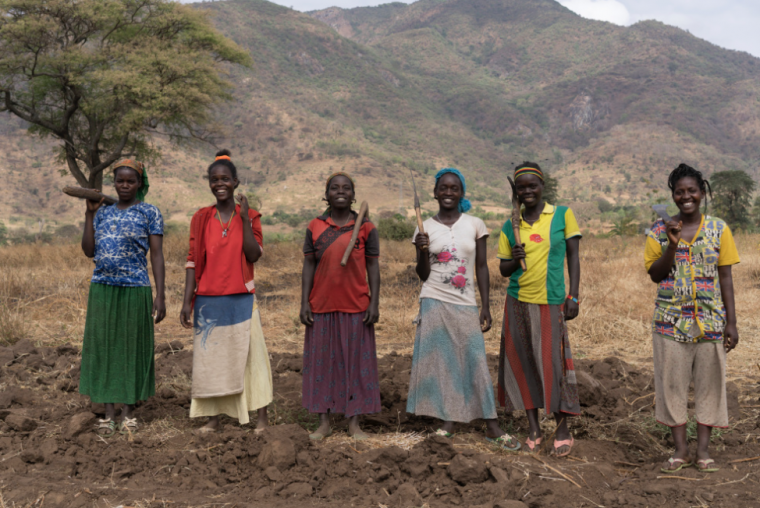The role of business in creating an equal world
Michelle Obama once said: 'No country can ever truly flourish if it stifles the potential of its women and deprives itself of the contributions of half its citizens.'
We hold this truth to be self-evident. And yet, across the world tens of millions women work in insecure, poor and precarious conditions, with limited employment rights or social protection and few opportunities to advance.
At the same time, women workers in developing countries continue to face violence and harassment – with unpaid care workers, informal economy workers and domestic staff being particularly at risk.

Evidently, the potential of women is still being stifled the world over.
These are some of the issues under the spotlight this week, as we mark International Women's Day (IWD) on Friday, March 8. This year's theme, #BalanceForBetter, highlights the need to accelerate balance in all spheres of life.
As a woman in the international development sector, and as someone who has spent most of my career in the corporate world, I know that tackling inequality and injustice isn't just about charities delivering programmes overseas to fight gender injustice and promote inclusion – as critical as this work is.
If we are truly committed to uprooting systems and structures that keep people poor, then we also need to address opportunities and challenges that businesses face in implementing the Sustainable Development Goals: including those goals relating to decent work, inclusive economic growth and inequality between, and within, nations.
How do we do this? Yes, we can 'name and shame' the worst examples of corporate irresponsibility and call out business practices that foster a culture of social exploitation, poor governance and environmental degradation.
Indeed there are already several global processes in place designed to hold corporates accountable. For instance, steps are being made to find a legally binding global solution to end the violence and harassment that women workers in developing countries experience.
Elsewhere, many civil society groups overseas are pushing for a legally binding UN treaty to regulate transnational corporations. They see this as a critical tool for holding them to account for human rights abuses, and ensuring justice for communities affected by their actions.
Closer to home, it is also imperative that we inspire, support and equip corporate leaders – both women and men – to take their share of responsibility in building a safer world where everyone has enough resources to live life to the full.

This need is one of the driving forces behind the creation of the Salt Business Network, which exists to mobilise Christian business leaders in the UK who are committed to achieving a world without poverty.
Launched by Christian Aid a little over two years ago, Salt Network has a vision to support, equip and encourage its members to reconsider the purpose and practice of their work in the light of faith, in order to proactively frame business as a force for good in the world.
Through a variety of initiatives we support business leaders – whether their enterprise is big or small – to improve UK business practices. All that matters is their commitment to build a business that is good news for all.
This vision of 'business for good' is fast becoming a movement that is uniting people across the UK to be salt and light in their industries, driven by a common faith and working together for the common good. We are increasingly hearing Salt members talking openly about how their faith is inspiring them to challenge inequality throughout their business models.
Through regional Salt Hubs, we have engaged in dialogue with our members about the importance of tracking significant risks to global development that stem from business practices, as well as exploring measures to address such risks.
Examples of such measures might include investing in renewables rather than fossil fuels, making public statements about tackling modern day slavery in supply chains, and conducting human rights risk assessments, based on the UN Guiding Principles on Business and Human Rights.
Meanwhile Salt Network members have also voiced their support for overseas initiatives that equip women entrepreneurs in some of the world's most marginalised places to realise their full potential.
Just last November, I travelled with members of the network to Bolivia to see this work in action. There, Christian Aid is working with some of the poorest indigenous communities in the Bolivian Amazon, to help build eco-tourism businesses that don't just provide a bright economic future for their rural communities, but do so whilst protecting the vital ecosystem.
Importantly, many businesses we met there are working hard to ensure that women are not just included with in the workforce, but are also actively recruited into highly skilled roles such as finance and business management.
Put simply, including women on equal terms in business isn't just transformative for business: it can also reshape the world in which we live.
So whether it's supporting entrepreneurs in Bolivia or improving business practices in Britain, I am convinced of another self-evident truth: that when business is done in a way that champions dignity, equality and justice, it can be a force for good – one that redresses the balance for women the world over.
Helen Howe is the Salt Business Network Lead at Christian Aid. The Salt Network's newest regional hubs will launch in Aberdeen on March 16 and Edinburgh on March 18.











